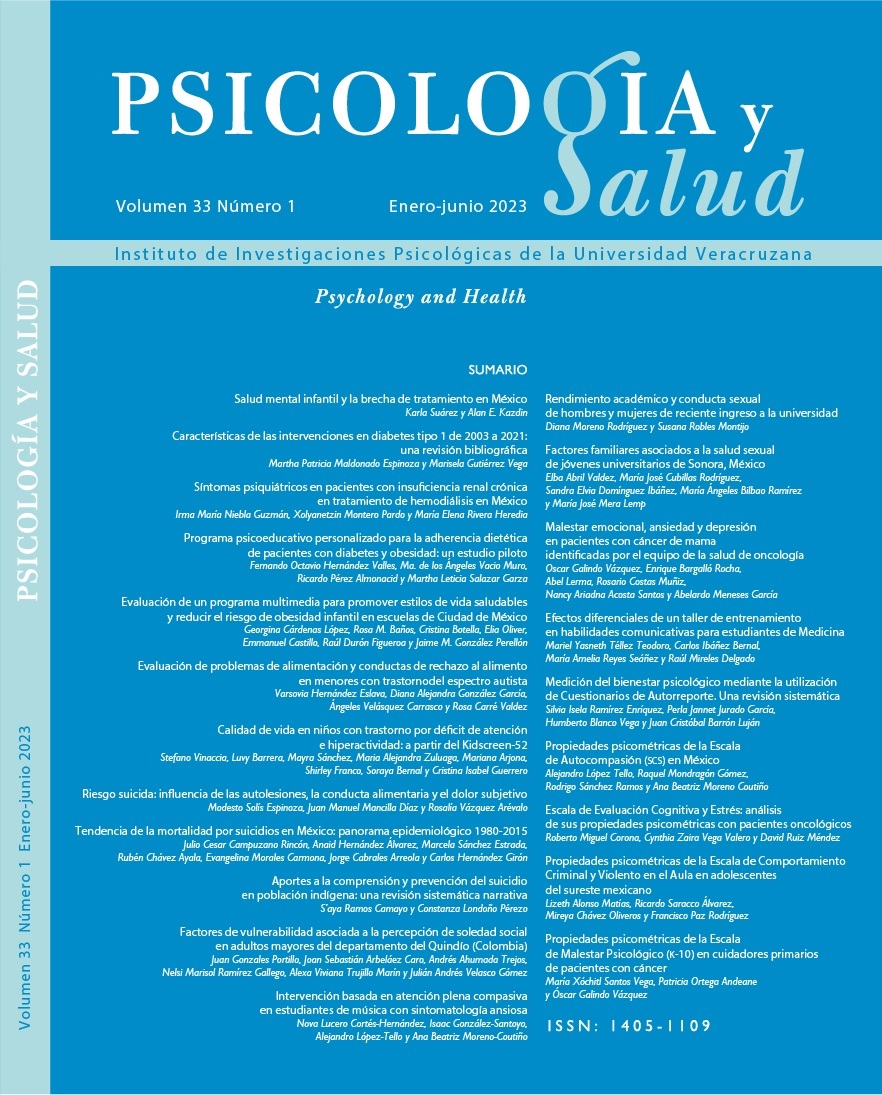Abstract
Introduction. Breast cancer patients’ psychosocial needs may influence the success of multidisciplinary treatment. Objective. To determine the psychosocial needs of patients with breast cancer as reported by their healthcare team. Method. The study consisted of a national online survey with a non-experimental cross-sectional design, and sampling by availability. Participants. A total of 254 professionals, mainly surgical and medical oncologists from public and private health institutions completed an expressly designed questionnaire. Results. Most health professionals directly ask their patients about their emotional problems (72%); however, only 8% use a validated scale or questionnaire. Most of them have access to mental health services. They report that patients express emotional concerns about their quality of life (65%), adherence to treatment (42%), and disease progression (41%). The factors associated with emotional distress, anxiety, and depression include other psychological problems as physical symptoms such as appetite loss, and memory and sleep problems. Conclusions. Greater dissemination of psycho-oncology clinical guidelines and evidence-based psychosocial care programs for patients with breast cancer should aim to train medical teams.
References
Bray. F., Ferlay. J., Soerjomataram. I., Siegel. R.L., Torre. L.A. y Jemal. A. (2018). Global cancer statistics 2018: GLOBOCAN estimates of incidence and mortality worldwide for 36 cancers in 185 countries. CA: A Cancer Journal for Clinicians, 68(6), 394-424. Doi: 10.3322/caac.21492.
Brintzenhofeszoc, K., Davis, C., Kayser, K., Lee, H.Y., Nedjat-Haiem, F., Oktay, J.S. y Zebrack, B.J. (2015). Screening for psychosocial distress: A national survey of oncology social workers. Journal of Psychosocial Oncology, 33(1), 34-47. Doi: 10.1080/07347332.2014.977416.
Bultz, B.D., Groff, S.L., Fitch, M., Claude, M., Howes. J. y Levy, K. (2011). Implementing screening for distress, the 6th vital sign: A Canadian strategy for changing practice. Psychooncology, 20(5), 463-469. Doi: 10.1002/pon.1932.
Castillo L., R.L., Marván G., M.L., Vázquez O., G. y Landa R., E. (2017). Afrontamiento en pacientes con cáncer de mama: una revisión narrativa. Revista Latinoamericana de Medicina Conductual, 8(1), 35-41.
Costas M., R., Hunter H., M., Garduño O., O., Morales C., J. y Gany, F. (2017). Ethnic differences in psychosocial service use among non-Latin white and Latin breast cancer survivors. Journal of Psychosocial Oncology, 35(4), 424-437. Doi: 10.1080/07347332.2017.1310167.
Galindo V., O. y Costas M., R. (2019). Evidence-based psycho-oncology: A priority in mental health. Salud Mental, 42(3), 101-102. Doi: 10.17711/SM.0185-3325.2019.013.
Ganz, P.A., Yip, C.H., Gralow, J.R., Distelhorst, S.R., Albain, K.S. y Andersen, B.L. (2013). Supportive care after curative treatment for breast cancer (survivorship care): Resource allocations in low- and middle-income countries. A Breast Health Global Initiative 2013 Consensus Statement. The Breast, 22(5), 606-615. Doi: 10.1016/j.breast.2013.07.049.
Hubbeling, H.G., Rosenberg, S.M., González R., M.C., Cohn, J.G., Villarreal G., C. y Partridge, A.H. (2018). Psychosocial needs of young breast cancer survivors in Mexico City, Mexico. PLoS One, 13(5), 1-23. Doi: 10.1371/journal.pone.0197931.
İzci, F., İlgün, A.S., Fındıklı, E. y Özmen, V. (2016). Psychiatric symptoms and psychosocial problems in patients with breast cancer. The Journal of Breast Health, 12(3), 94-101. Doi: 10.5152/tjbh.2016.3041.
Justo, N., Wilking, N., Jönsson, B., Luciani, S. y Cazap, E. (2013). A review of breast cancer care and outcomes in Latin America. The Oncologist, 18(3), 248. Doi: 10.1634/theoncologist.2012-0373.
Kiss, A. (1995). Psychosocial/psychotherapeutic interventions in cancer patients: consensus statement, Flims 1995. Support Care in Cancer, 3(4), 270-271. Doi: 10.1007/BF00335903.
Lauzier, S., Maunsell, E., Levesque, P., Mondor, M., Robert, J., Robidoux, A. y Provencher, L. (2010). Psychological distress and physical health in the year after diagnosis of DCIS or invasive breast cancer. Breast Cancer: Research and Treatment, 120(3), 685-691. Doi: 10.1007/s10549-009-0477-z.
Lerman, C., Daly, M., Walsh, W.P., Resch, N., Seay, J. y Barsevick, A. (1993). Communication between patients with breast cancer and health care providers: determinants and implications. Cancer, 72(9), 2612-2620. Doi: 10.1002/ 1097-0142(19931101)72:9<2612::AID-CNCR2820720916>3.0.CO;2-F.
Martínez B., A.E., Lozano A., A., Rodríguez V., A.L., Galindo V., O. y Alvarado A., S. (2014). Impacto psicológico del cáncer de mama y la mastectomía. Gaceta Mexicana de Oncología, 13(1), 53-58.
Mitchell, A.J., Kaar, S., Coggan, C. y Herdman, J. (2008). Acceptability of common screening methods used to detect distress and related mood disorders-preferences of cancer specialists and non‐specialists. Psycho‐Oncology: Journal of the Psychological, Social and Behavioral Dimensions of Cancer, 17(3), 226-236. Doi: 10.1002/pon.1228.
Montazeri, A., Vahdaninia, M., Harirchi, I., Ebrahimi, M., Khaleghi, F. y Jarvandi, S. (2008). Quality of life in patients with breast cancer before and after diagnosis: an eighteen months follow-up study. BMC Cancer, 8(1), 330. Doi: 10.1186/1471-2407-8-330.
Moral C., M., Robles G., R., Jiménez P., M. y Morales R., J. (2007). Las mujeres mexicanas con cáncer de mama presentan una alta prevalencia de depresión y ansiedad. Salud Pública de México, 49, 247-248.aa.
Organización Mundial de la Salud (2014). Cáncer de mama: prevención y control. Ginebra: OMS. Recuperado de https://www.who.int/topics/cancer/breastcancer/es/index4.html.
Pirl, W.F., Muriel, A., Hwang, V., Kornblith, A., Greer, J., Donelan, K. y Schapira, L. (2007). Screening for psychosocial distress: a national survey of oncologists. The Journal of Supportive Oncology, 5(10), 499-504.
Vázquez R., L.A., Galindo V., O., Bargalló R., E., Herrera G., Á., Cabrera G., P., Meneses G., A., Lerma T., A. y Aguilar P., J.L. (2017). Factores predictores de función cognitiva, sintomatología de depresión y ansiedad en pacientes con cáncer de mama. Revista Latinoamericana de Medicina Conductual, 8(1), 24-34.
Waller, A., Williams, A., Groff, S.L., Bultz, B.D. y Carlson, L.E. (2013). Screening for distress, the sixth vital sign: examining self‐referral in people with cancer over a one‐year period. Psycho‐Oncology, 22(2), 388-395. Doi: 10.1002/pon.2102.

